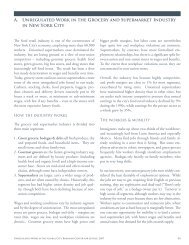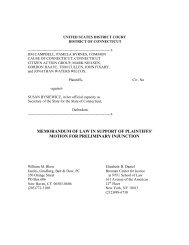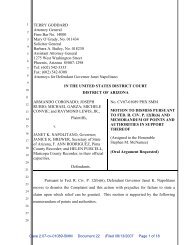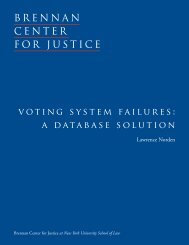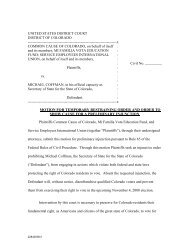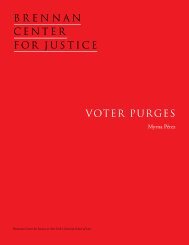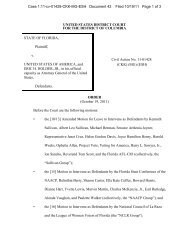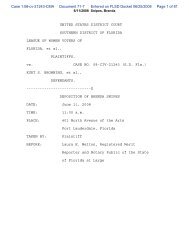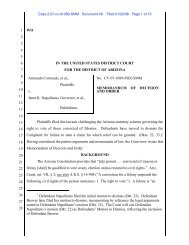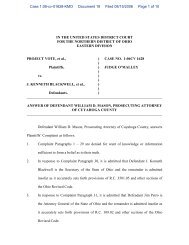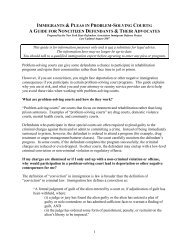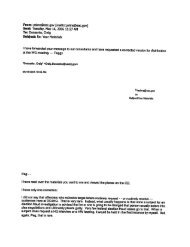Roxana Robinson described her second book,a biography of Georgia O’Keeffe. “She had justdied; there were three lawsuits going on [battlingover her estate]. Everyone was at each other’sthroats. So I was incredibly careful. I had to typeout every single quote I wanted to use of herletters, and send those to the Georgia O’KeeffeFoundation. One member of the Foundationwas completely opposed to my writing the book,and he would not give me any permissions at allthat he was responsible for.“I was told by my publisher that fair use was15% of whatever the text was. Those numbersare branded in my brain. 15% of the letter,or perhaps 15% in the page of the book I wasquoting from, called Georgia O’Keeffe by GeorgiaO’Keeffe. So I had to go through that book andpractically count the words on every page andallow myself 15% of that. I felt that I was skatingon the edge of this dangerous chasm and if I fell,I could be sued.“At one point, late in the process, I discovereda trove of letters that no one had ever seen,between O’Keeffe and, probably, her firstromantic lead. I wasn’t going to have time toclear them through the O’Keeffe Foundation.But I thought it would be too much for the manwho owned them to suddenly see them spreadout in this biography. So I was very carefulabout those, just because of internal conscience.Which I think now was foolish. I think I shouldhave used them just as much as I wanted to. Butas a biographer, I was very conscious of the otherside. You are using other people’s lives, or otherpeople’s works or thoughts, and so it is a reallydifficult question to balance.”Hazel Rowley described a different experiencewith her Richard Wright biography. “I took animmense risk because Ellen Wright, his widow,had sued a previous biographer, MargaretWalker. I had been warned that Ellen Wrightwas very difficult. I knew I would get nowhereby fronting up to her at the beginning, saying‘Will you sign this form giving me permission toquote from unpublished letters?’ So I wrote thewhole biography, four years of work, taking therisk that she might not give me permission toquote from unpublished material. I spent threemonths in the Beinecke Library at Yale, which hasa massive amount of exciting material. It wouldhave killed the book if she’d refused. If there’sone thing worse than being a white Australianwoman writing about a black American man, itwould have been not to be able to bring his voicein. So the risk I took, when I look back, wasenormous.“Ellen Wright was savage about MargaretWalker, who had quoted letters from Wrightto Walker. Of course, Walker, the recipient ofthe letters, did not own the copyright. So EllenWright sued her, but she lost. 110 I came along afew years later with my biography. I wrote thebook the way I wanted to write it, just as if she’dgiven me permission to quote from unpublishedletters. I sent her some articles I published alongthe way, which she liked. When I’d finished, Iwent to Paris to see Ellen, and had lunch withher. Halfway through the lunch, I casually said Iwould need copyright permission from her. Sheasked whether the publisher would pay for thepermissions. I said, ‘Sadly, not.’ She asked me tosend a word count to Wright’s literary agent. Shesaid she thought I had done a good job, and mybook would revive interest in Wright. She woulddiscuss the price with Wright’s agent, but she’dtry to keep it low. She understood that I didn’thave much money. To my amazement, she neverasked to see the manuscript. I didn’t mention thatsome of the unpublished letters I had managedto find were not among those in the BeineckeLibrary; indeed, they were love letters that EllenWright would find deeply hurtful. Ellen gavepermission, for a very reasonable fee.“I had a fellowship for two months to studyat the Beinecke and took an immense amountof notes. I think American copyright law takesinto account that there is no point in givingscholars access to material if they can’t quoteit even minimally. I boned up on fair use. It iscertainly not 15%, in my understanding. It isfar more minimal than that. The most I allowedmyself from the love letters were eight words aletter, ten words maybe, in a letter of a page ortwo. Publishers never seem to know much aboutit. It’s quite extraordinary. It’s more a matter ofringing around talking to any copyright peoplewho know something. And looking on theInternet. It’s inordinately difficult to find out.”Rowley’s last book was about Sartre andBeauvoir. “Sartre’s published estate is mostly16 Will Fair Use Survive?
owned by Gallimard [the French publisher].But the unpublished estate is in the hands ofthe woman whom Sartre adopted when shewas in her 20s, Arlette Elkaïm Sartre. AndBeauvoir’s adopted daughter is the executorfor the Beauvoir estate. When I started out onthe book, I was told again, just as I was withEllen Wright: ‘There’s no way you’re going to getanything from Arlette.’“I’m writing the book for Harper Collins,and from the outset my understanding was thatI would have fair use of the unpublished materialI got to see from Sartre. Any letters – and I gothold of hundreds – I could just do the slightestquoting, and some loose paraphrase. One womangave me 550 pages of Sartre’s handwritten lettersto her mother. I quoted up to 30 lines, thinkingthat’s all I can get away with. I paraphrase veryloosely, always in my voice. My understanding isthat loose paraphrasing is fine.“I have since discovered that copyright lawis different in France. I wanted the book to bepublished in France as soon as possible. Gallimardwanted it, but insisted that they would need theconsent of the two adopted daughters. I said:‘Consent for what?’ But Gallimard, which makesmassive posthumous royalties from the Sartreand Beauvoir estates, did not want to risk fallingout with the two heirs and literary executors. Isoon found out that in France there’s this thingcalled le droit moral. 111 And they do not havefair use for unpublished material. You cannotquote and you cannot paraphrase, even loosely,without permission.“So the manuscript was sent to bothdaughters, and the Beauvoir daughter says fine,and the Sartre daughter says to Gallimard: ‘If youpublish that book, I’ll take away the entire Sartreestate from you.’ In other words, Gallimardwon’t be publishing this book. Then Arlettetold me that even interviews with her or withSartre, I’d have to cut out all the quotes. Well,luckily on that score I was safe. The interviewerhas the copyright on them. But she also said Iwould have to take out all paraphrasing fromthe letters. Harper Collins’ lawyer was at firstvery laid back and said, ‘we’ll publish it as is,and we’ll show up the French.’ But my editorat Harper Collins said, ‘Hazel, we can’t havetwo editions. We have sold subsidiary rights toEngland, for example. They’ve bought in goodfaith with the understanding that they candistribute that book at least to English-speakingbookshops in Paris.’ She says if it’s smuggledinto France in any way, even through Amazon,the English publisher could get sued and theycan sue HarperCollins US, and everybody’svery unhappy, and therefore, I have to makethese cuts.“I’m refusing to make the cuts. I’m saying Iworked within American law, and that the bookis fine in this country.“I don’t think you can be a biographer withoutbeing a fiercely determined kind of person.And the fact that I got to see these letters fromvarious women around Europe is in itself fairlyamazing. So I’m not going to give up a fight justlike that. 112“This is a subject that worksus all up, isn’t it?”“I find the whole copyright thing enormouslyarbitrary. Some people charge you $350 for fivelines. Some charge you nothing for several pages.There are no rules, so you’re always in a ratherstupid, mendicant position as a permissionseeker. Harper Collins did tell me that theyhad someone that would do it for me, but Ididn’t feel like paying several thousand dollarsfor somebody else to do it. Also, I frequentlymanaged to negotiate the prices down. I can’timagine the person to whom Harper Collinscontracts out this job doing that for me.“But oh my god, the problems you can have!I have quoted quite a bit of Nelson Algren[Beauvoir’s lover at one time] – previouslypublished material. The Algren copyright holderis a literary agent in New York. Over the months,he did not answer my emails, he did not answerphone calls, he did not answer letters. I had toapproach him through intermediaries. He askedto see the entire manuscript. He wanted to checkthat I’d portrayed Algren sufficiently positively.It’s really insulting. This is a subject that worksus all up, isn’t it?”Brennan Center for Justice 17
- Page 1 and 2: WILLFAIR USESURVIVE?Free Expression
- Page 3 and 4: WILLFAIR USESURVIVE?Free Expression
- Page 5: ContentsExecutive Summary . . . . .
- Page 9 and 10: unhappy years of World War II.” 1
- Page 11 and 12: Although §512 does allow an ISP
- Page 13 and 14: music, distance learning, interlibr
- Page 15 and 16: CHAPTER 1The Legal LandscapeThis ch
- Page 17 and 18: Court’s “Oh, Pretty Woman” de
- Page 19 and 20: the public would be confused about
- Page 21: CHAPTER 2Quoting Sartre, Using Prok
- Page 26 and 27: well, this and this person gave it
- Page 28 and 29: you can do with the pages of Time a
- Page 30 and 31: going to start writing letters for
- Page 32 and 33: causing problems for our communitie
- Page 34 and 35: or Not’ people. So we took it dow
- Page 36 and 37: The American Pool Players Associati
- Page 38 and 39: “Paris Hilton Sex Tape” 150 (ho
- Page 40 and 41: howardhallis.com,” a comedy and c
- Page 42 and 43: legitimate borrowing of protected m
- Page 44 and 45: Dan Hamilton, managing editor of th
- Page 46 and 47: legal action as long as eInfoworld
- Page 48 and 49: At that point, Cox took to the blog
- Page 50 and 51: her books, but not created by Anne
- Page 52 and 53: CHAPTER 5Internet Infidels and Home
- Page 54 and 55: she attributed to the many form let
- Page 56 and 57: “Without his permission, the gove
- Page 58 and 59: eproducing an artwork in a book wit
- Page 60 and 61: ConclusionWhat can we learn from th
- Page 62 and 63: Reiff thought that instead, the gov
- Page 64 and 65: Endnotes1 Mattel v. Walking Mountai
- Page 66 and 67: 48 See Katie Dean, “Eyes on the P
- Page 68 and 69: 109 Not an exact quote. See Alan Al
- Page 70 and 71: 149 http://msophelia.blogspot.com/p
- Page 72 and 73:
215 “MBA Legal Defense Initiative
- Page 74 and 75:
lank left hand page
- Page 76:
161 Avenue of the Americas12 th Flo



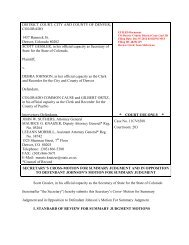
![Download the Letter [PDF] - Brennan Center for Justice](https://img.yumpu.com/50139248/1/190x245/download-the-letter-pdf-brennan-center-for-justice.jpg?quality=85)
